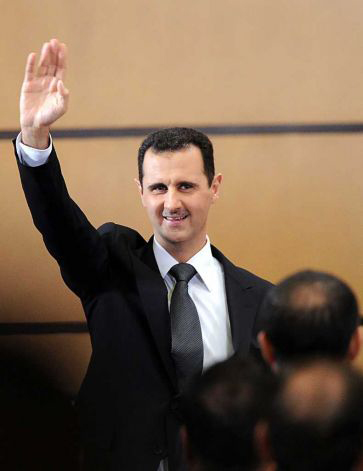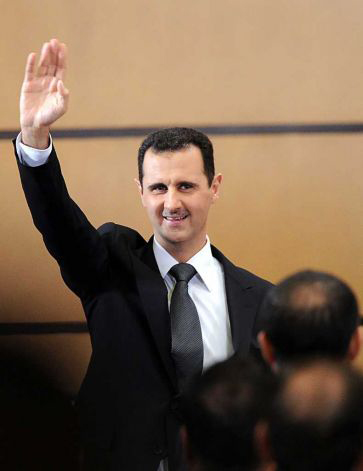Assad Changed the Fate of the World... And He Will Not Leave

Sami Kleib
Had the Syrian regime been toppled, or had President Bashar al-Assad been weakened, killed or had he stepped down, the world would not have needed a nuclear deal with Iran, the US and its NATO allies would not have needed to coordinate with Russia, the Muslim Brotherhood would have reached the gates of the Persian Gulf, and Turkish President Recep Teyyip Erdogan would have been sitting in his palace smiling at the scorching fire [in the region].

This is a reality, at which we should pause for a moment, and this reality does not change no matter how divided the world becomes between those holding Assad majorly responsible for the destruction of Syria, or those who consider Assad as the first reason behind the steadfastness of Syria and its salvation, until Syria succeeded in changing the compass of the regional and international policies owing to the blood of its army, sons, and those who fought alongside including Hizbullah and the Syrian Social Nationalist Party and others.
Because world policies are built on interests rather than dreams and illusions, the Syrian army imposed itself as a player in the coming formulas, which aim to combat terrorism and eradicate "ISIL" as well as ending other projects related to the future of the region.
And because world policies are built on interests rather than dreams and illusions, the Syrian opposition presented the worst image throughout the history of nations. It suffered divisions several times; they traded accusations of treason among each other, resorted to a policy of excluding rivals despite the fact that they had suffered the same fate earlier.
The majority of [this opposition] sold itself numerous times to countries that have ambitions inside Syria; it did not even want to see a real process of democracy and liberties take place, lest it be contagious. Here it is now, at the doors of the UN pending its undecided fate, seeking crumbs from what is left of the nuclear deal.
Most Western studies assure that, if elections were to take place under international cover and public supervision, Assad might win, not only because of his popularity which is still at a good level, but also because there is no real competitor among his opponents, some of who cannot even get a visa to enter countries that once claimed to be Syria's "friends".
The people, also, after this vicious war, and after the mistreatment of refugees and the harsh circumstances and danger in areas under the control of takfiri terrorists, find that only their own country is capable of embracing them, and their army protect them.
This might come off as support for President Assad, and many are sure to throw accusations, but since the beginning of the Syrian crisis, I have personally written, saying that the balance of power, the firmness of the Syrian army, the steadfastness of the central state, which up until now, is still paying salaries [to employees], the survival and composure of the main popular nerve supporting the state, the resolve of allies such as Russia, Iran and others [because their interests also require such steadfastness], and the firm and calm personality of President Bashar al-Assad, will not allow the formula to change or the regime to collapse.
Back then, my words also came off as support for Assad, but all I had written was based on facts, not on dreams and illusions.
Knowing what happened or how Syria came to this formula of "either state or terrorism" is inconsequential; it is already there. The US and its allies in the NATO are no longer able to control the chaos they once thought would, at best, topple the [Syrian] regime, encircle Iran, and eliminate the resistance, or at worse, leave Syria destroyed, its army devastated, and then "Israel" would be at ease.
Those who have been visiting Assad these days may have noticed the following:
- Priority still goes to the military battle, because it is the only battle that proved to be useful in face of the fierce counter-attacks.
- Syria will respond to political initiatives as long as its allies -including Russia and Iran- are at the heart of whatever is suggested, but the US and NATO countries are not yet trustworthy, because if they really wanted solutions, they could have dried out the source of terrorism and its funding, closed the Turkish borders, and restrained those still financing and controlling terrorism on Syria's land.
- Assad smiles when he is told that "Iran will sacrifice you in person to get the [nuclear] deal". For Assad, the matter is not about persons or emotions, the interest of Iran and the resistance lies in the stability and firmness of Syria just like Syria's interest decrees it should be firm in its position towards its allies. Assad, maybe, has Iranian and Russian messages that contradict with everything being said, and maybe, he knows that those leaking such words [of ill-will] want to create discord between Syria and Iran on the one hand, and weaken Iran on the other.
- Assad feels that regional and international "winds" are changing direction, but his trust in the winds is weak, and therefore he should preserve a firm military and political stance and give priority to the domestic arena just like the case was at the beginning of the battles. When there is any political initiative that suits Syria and its role then there would be no hesitation in responding to that initiative positively. Nothing can prevent important military developments alongside the diplomatic drive during the coming weeks.
What is being said about countries starting connections with Damascus is important, but more important is that which has been left unsaid. If [Syrian Foreign Minister] Walid al-Moallem speaks up, he will reveal a lot. According to his visitors, Assad feels that the world is convinced with his viewpoint on terrorism, "but unfortunately they became convinced only after terrorism knocked at their doors and started to kill their peoples, even though he warned them repeatedly and sent precise information to all those countries through Syria's representatives at the UN or through others."
That veteran diplomat Walid al-Mouallem would go to Muscat, and purposely keep his smile, from that calm and beautiful country that wove the first threads of talks between Iran and the US, means that knows well that the messages behind his smiles from the heart of the [Persian] gulf can hold many meanings.
Some might unleash their imagination and say that yes, the world wants Syria and the Syrian army, refusing the fragmentation of the country's institutions, yet would still want Assad to leave, but things in Syria imply that all these institutions and Assad have become one.
As for the new Turkish adventure under the pretext of fighting "ISIL", Damascus sees this move as a cover for Syria's political defeat of Erdogan, who realizes full well that his failure in the elections, his failure in forming a coalition government, as well as his failure in taming the Kurds are all fruits of his short-term political vision on neighboring Syria, which, at one time, opened its doors to Turkey. Even Saudi Arabia is upset with the Turkish move.
There is no doubt that each and every Syrian including all Syrian army officers and soldiers want to be rid of this war, which has destroyed people, stone, and soul. Yet simultaneously, Bashar al-Assad has unquestionably become the symbol of persistence to those who have been fighting with him for four years.
He did not leave office when the entire Western world, NATO countries, [Persian] Gulf countries and Turkey, tried to topple him, so now that everyone needs Syria to battle terrorism and maybe need Syria and Iran later in truces and settlements in the region, will he leave today?
A person must be a dreamer, disillusioned or short-sighted to think that the first initiative proposed by Iran after its nuclear deal with the West would require the stepping down of a President who could have won the support of the West, the NATO countries, and the Gulf by simply selling Iran or the resistance since the insane George Bush invaded Iraq and killed its people.
Maybe that is why Assad smiles, despite all the destruction and tears.
Source: Al-Binaa Newspaper, Translated and Edited by website team
Comments




